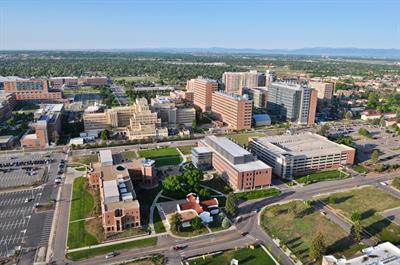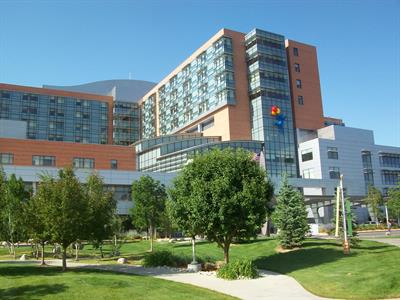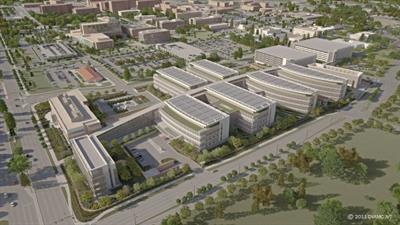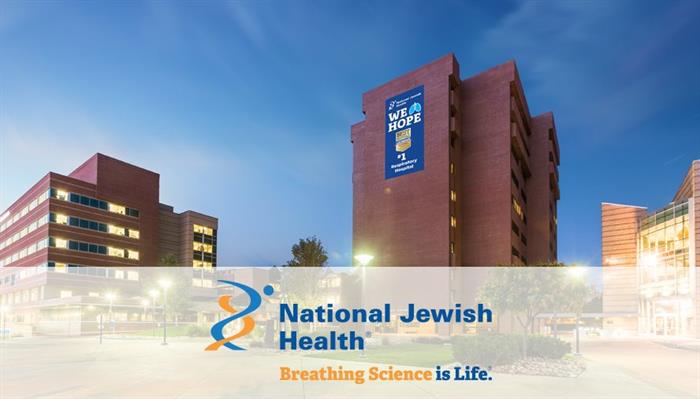
Schedules and Sites of Work
General Schedule Overview
Our academic year consists of 13 Rotations. Services include: Body, MSK, Fluoro, Breast, Neuro, Peds, IR and more! Our residents rotate through University of Colorado Hospital, Children's Hospital Colorado, Denver Health and the VA.
Every rotation has
competency-based goals and objectives which are specific to each year/PGY-level
of training. These documents are accessible on MedHub, an online program that
is used by the department.
Training Sites

At CU, our residents learn from nationally and internationally recognized subspecialty-trained faculty and have the opportunity to perform cutting-edge research. Residents spend approximately 24 months of their training at the AMC. Our residents are involved in the performance, supervision and interpretation of a large volume of studies totaling over 440,000 examinations per year. These include approximately 82,000 CT studies, 60,000 ultrasounds, 38,000 MRI studies, 33,000 mammograms, 15,000 fluoroscopic procedures, 11,000 radionuclide examinations, and 10,000 interventional procedures. A computerized voice-recognition system is used throughout the department and we have web-based viewing capabilities. CU is one of the fastest growing, most comprehensive medical centers in the country.
The University of Colorado Hospital opened its new $644 million, 820,000-square-foot facility on the Anschutz Medical Campus in 2007. CU Anschutz integrates world-class education and cutting-edge facilities in research and patient care on one of the nation’s newest medical campuses in the country.
The University of Colorado ranked as the #6 highest-performing academic hospital in the US in 2015 by the University HealthSystem Consortium. CU was ranked as the nation's #1 academic hospital in both 2011 and 2012, and a top-10 hospital in 2013. In addition to being named among the top 10 academic hospitals in the United States, U.S. News & World Report ranks University of Colorado Hospital as the best in the state. For the first time, U.S. News and World Report has named University of Colorado Hospital (UCH) to the Best Hospitals Honor Roll, recognizing it as one of the nation’s top 20 hospitals out of almost 5,000 evaluated. U.S. News has also named UCH as the number one hospital in Colorado, with 10 individual specialties ranked among the best in the United States.

The Radiology Department at Children's Hospital Colorado (CHCO) is recognized for their expertise in evaluating and imaging the broad spectrum of childhood diseases and conditions using state-of-the-art diagnostic equipment with special pediatric features. Our residents receive exceptional training from 20 board-certified, fellowship-trained pediatric radiologists. Subspecialty expertise is provided by staff with dual fellowship training in pediatric radiology as well as interventional, cardiothoracic, musculoskeletal and neuroradiology. CHCO is the only Level 1 Pediatric Trauma Center in Colorado. Approximately 200,000 imaging studies are performed at CHCO each year.
Radiology residents spend three months at CHCO, each 4 week rotation encompassing a week in Body imaging, Neuroradiology, Musculoskeletal/Nuclear medicine and Fluoroscopy. Participation in daily rounds with the neonatal intensive care unit service and multidisciplinary conferences in all specialties offer opportunity for interaction with clinicians and insight into the complexity and challenges of caring for our youngest patients. There is a strong emphasis on education with a didactic pediatric radiology lecture series (two per week) dedicated to the radiology residents.
Children's Hospital Colorado is consistently ranked one of the nation's top pediatric hospitals by U.S. News & World Report & Parents Magazine and is currently ranked #5 in the Best Children’s Hospitals Honor Roll by U.S. News & World Report in 2016. CHCO ranked in nine of the ten specialties surveyed and six of the hospital’s specialties ranked among the top 10, including Diabetes & Endocrinology, Neonatology, Gastroenterology & GI Surgery, Pulmonology, Orthopedics, and Oncology.

Founded in 1860, Denver Health is an academic, integrated safety-net hospital and trauma center for the rocky mountain region. It is a national model as an integrated health system, which includes a network of community health centers and school based clinics. It is the only institution in the state certified by the American College of Surgeons as both an Adult Level 1 and Pediatric Level 2 Trauma Center. The entire organization is focused on evidence based high quality health care with effective use of limited resources. Our residents spend 12 months of their training at DHMC.
The Denver Health radiologists support this system, with imaging at the hospital and several outlying sites, including the Winter Park Resort. The 15 attending radiologists at Denver Health are all subspecialty, fellowship-trained radiologists with University of Colorado faculty appointments. However, they each practice across subspecialties, which provides a model for residents different than seen at the University and more like many community practices. The physical layout at Denver Health also facilities close cross-specialty communication. The department performs approximately 200,000 imaging studies each year, with expectations that this number will continue to rise in the foreseeable future.
The Rocky Mountain Regional Trauma Center has one of the best trauma survival rates in the nation, acting as the major trauma receiving hospital for the City and County of Denver and the Rocky Mountain Region. Denver Health has ranked in the top 5% for inpatient survival for 6 consecutive years and has been among the top 1/3 of US academic health centers in overall quality for 10 consecutive years.

Since 1951 the VA Eastern Colorado Healthcare System has provided quality care to veterans of our community and surrounding areas. From surgery to diagnostic radiology, primary care to rehabilitation, they care for America's heroes! The new $1.7 billion VA Medical Center opened on the Anschutz Medical Campus in 2018.
Residents spend at least 6 months of their training at the VA Medical Center. Rotations include Body Imaging, Neuro, Vascular and Interventional Radiology, Ultrasound, Fluoroscopy, and Nuclear Medicine.

National Jewish Health is the only facility in the world dedicated exclusively to groundbreaking medical research and treatment of patients with respiratory, cardiac, immune and related disorders. It has been named the best respiratory hospital in the nation for the 15th consecutive year.
The University of Colorado Cardiothoracic radiologists, fellows, and residents participate in multidisciplinary conferences at National Jewish Health.
Call and Moonlighting
Moonlighting
The Department of Radiology allows internal and external moonlighting opportunities for the residents. We emphasize the need for our residents to have ample time for reading, other Radiology activities, and work-life balance.
Call Duties
Our department has a dedicated Emergency Radiology section made up of subspecialty-trained faculty that provide overnight coverage at both the University Hospital and Denver Health. Residents provide 24/7 Emergency Department coverage at these sites as well.
Weekend call is split between the University Hospital and Denver Health, and shared among all upper level residents (R2-R4). Residents are removed from the call pool in the four months prior to their CORE examination at the end of the their third year in order to allow adequate preparation time.
First year residents (PGY2/R1) begin taking weekend call in October of their first year, taking call with another upper level resident and between two to four attending faculty members, depending on the site.
We employ a night float system to cover our overnight shifts. Residents complete two blocks of night float in their second year, two blocks in their third year, and one block in their fourth year. A “block” consists of two weeks of overnight shifts and two weeks of ED day/swing shifts. Both the University Hospital and Denver Health provide 24/7 MRI and Ultrasound technologist coverage.
While on Interventional Radiology rotations, residents cover one to two nights of weeknight primary call and assist a fellow with weekend call for one to two weekends during the month. The IR service covers the University Hospital and Denver Health while on call. Attending coverage is available at both hospitals at all times.
Elective Rotations
Residents are typically granted at least one or two months of elective time during the second, third, and fourth years of training. Electives must occur at the hospital to which the resident is assigned at the time it is awarded, and may be used to pursue additional clinical training in an area of interest or to pursue a research or quality project.
In addition to the elective rotation, other elective opportunities include a Clinician-Educator month where the resident teaches medical students in the BAR Lab and creates modules/presentations and a Quality month where the residents spends time working with the institutional and departmental quality teams and focuses on a quality project.